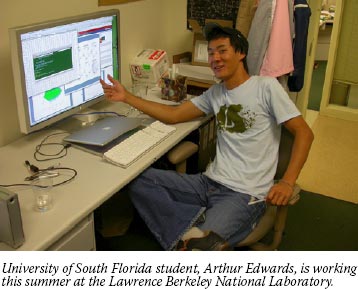
Undergrads Try Integrative Science
It's June, the month when college students around the country finish their spring semester and head home to save money from summer jobs, or take summer classes so they can graduate on time. But a select group of 13 has bigger plans.
These students are recipients of Integrative Cancer Biology Program (ICBP) Cancer Research Fellowships, a program in its third year that places sophomores and juniors for 9 weeks in laboratories that study cancer as a complex integrative system, developing mathematical and computational models for diagnosis and treatment of the disease.
"One of the challenges for today's cancer researcher is incorporating large and diverse information about the disease. This increasingly requires multiple expertise and is a fundamental aspect of the ICBP," says Dr. Dan Gallahan, who directs the program and is deputy director in NCI's Division of Cancer Biology. "Through this fellowship, undergraduates are exposed to multiple disciplines addressing real cancer problems."
"The students who we select are exceptionally bright, but they're not sure what a career in research really means," explains Dr. Betty Tarnowski, ICBP education and outreach coordinator. "This program gives them the exposure to determine if research is something they would like to pursue."
Most of the ICBP fellows are biology majors, but many of them study math, engineering, computer science, or physics.
Anastasia Krymkowski, a double major in applied mathematics and computer science at the University of Vermont, with a minor in art, is working this summer with Dr. Thomas Deisboeck, who directs the ICBP Center at Massachusetts General Hospital, and with Dr. Santosh Kesari at the Dana-Farber Cancer Institute. She is using brain cancer stem cells and mathematical analysis to help develop computer models of tumor signaling networks.
"I enjoy thinking spatially, and modeling a virtual tumor seemed like the perfect fit for that," says Ms. Krymkowski, who is still weighing her options after graduation. "I've always known that were I to pursue a career in a medical field, I'd want to study something that has a devastating impact on people, so I'm definitely satisfied to be working on this project."
 Arthur Edwards, another ICBP
fellow who is studying bioengineering at the University of South Florida, is being mentored by Dr. Paul Spellman at the Lawrence Berkeley National Laboratory. Most of his friends are taking it easy at the beach this
summer, he says, while he's using Bayesian models to look at gene expression, gene copies, and methylation patterns in breast cancer.
Arthur Edwards, another ICBP
fellow who is studying bioengineering at the University of South Florida, is being mentored by Dr. Paul Spellman at the Lawrence Berkeley National Laboratory. Most of his friends are taking it easy at the beach this
summer, he says, while he's using Bayesian models to look at gene expression, gene copies, and methylation patterns in breast cancer.
"I'll be asking a lot of questions, since I don't really have too much training in this field," he says. His career plans include graduate school, but he's not sure yet what area of research will be his focus. "After this summer I'll have a better idea."
Students have much to gain from these fellowships: the chance to try their hands at cancer research with some of the nation's top scientists as mentors, as well as earn a stipend and explore a different city. But they're not the only ones who benefit from the arrangement.
"These eager students bring a refreshing new perspective to our challenging projects," says Dr. Deisboeck, whose mentoring last summer encouraged Christina Birch to begin graduate school this fall studying biological engineering at MIT, which hosts an ICBP Center, so that she can continue the integrative approach to research.
"We are delighted to contribute to the next wave of students who are trained in both the quantitative and quality aspects of cancer research," he says. "They are who this field needs desperately in order to move ahead."
—Brittany Moya del Pino
|